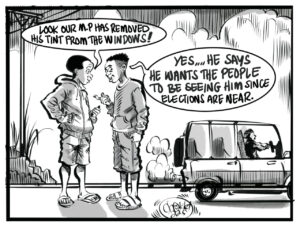The headline is no exaggeration: the war on cannabis currently being waged by the Drug Enforcement Commission and Zambian judges and magistrates is completely insane and deeply immoral.
Consider the sad case of Shakapeter Mzumala, a 52-year-old security guard in Chipata. Mr Mzumala was caged by DEC in September 2016 for “trafficking in 2.5 grams of psychotropic substances contrary to the laws of Zambia”, according to a report in New Vision newspaper posted to the DEC Facebook page.
Just days ago, Mr Mzumala was sentenced to 18 years imprisonment with hard labour by Lusaka High Court judge Mwila Kombe. Mr Mzumala had a previous conviction for cannabis and served 10 years in prison, so the judge threw the book at him.
In defending the draconian sentence, Justice Kombe stated: “It shows that you have not been remorseful and have no regard for the courts as you were previously sentenced to ten years for a similar offence but you did not learn your lesson. Therefore to deter would be offenders, I sentence you to a longer jail term of 18 years”.
Cannabis has been criminalized in Zambia for almost 100 years, since the British colonial government instituted the Opium and Habit-Forming Drugs Act in 1924. Since then, every government of the post-colonial era has maintained the laws against cannabis and other drugs, despite the plant having a long history of cultivation and use in Zambia. One might even say that cannabis is a “traditional” crop in this country.
Since it was criminalized by the federal government in the United States in 1937, more than 20 million Americans have been caged for cannabis, while at least half of all current prisoners in the US are being held for the drug.
Meanwhile, here in Zambia, since the US Drug Enforcement Administration began funding and training DEC in the 1990s, an estimated 100,000 people have been caged for cannabis, mostly poor and marginalised Zambians such as peasant farmers, unemployed youth, Rastafari, and children as young as 10 years old. These are poor and defenseless people who generally cannot afford expensive lawyers to plead their cases.
There is currently a major crisis of prison overcrowding in this country, a fact confirmed by the Zambia Correctional Services. Zambia currently has a record number of more than 20,000 inmates against an official capacity of just over 8000. It is now estimated that half of all Zambian prisoners are being held not for violent offenses or serious crimes but for cannabis “trafficking”, a non-bailable offense that guarantees prison overcrowding.
While most Zambians turn a blind eye, DEC has caging an average of 16 Zambians every single day for non-violent drug offenses, and have increased the pace at which they make arrests by 7% over last year.
Instead of making this country safer, DEC is fueling the deeply immoral crisis of prison overcrowding, which leads to violence, disease, and shame for those caged and their families.
Recently, Chief Justice Ireen Mambilima revealed that the Zambian judiciary is being let down by certain individuals within the courts. “Their work is characterized by laziness, practices such as corruption, misappropriation of funds, dishonesty and poor attitude towards members of the public – mistreating, pretending to be adjudicators, thus complaints from majority of Zambians,” the Chief Justice decried. “It is such corrupt and dishonest individuals that are letting down the judiciary.”
While it may not be “corruption” per se to sentence someone to 18 years for “trafficking” 2.5 grams of cannabis, it certainly is laziness on the part of the justice to not challenge the efficacy of such a harsh sentence. Two minutes of research online will reveal plenty of scientific evidence that harsh and draconian punishments do not deter “criminality”.
Justice Kombe and others would do well to consider their “attitudes to members of the public”, particularly those who cannot afford legal defense. Perhaps Justice Kombe could take some time to consider the growing body of scientific evidence that cannabis is not nearly as dangerous to public health and safety as alcohol or tobacco.
Or perhaps she could have taken a moment to consider the repeated complaints that the Rastafari community has made in Chipata against local DEC officials. The Rastas were literally laughed in their faces when they complained that their prayer grounds were destroyed in a raid last year in which officers fired their weapons, burned the altar, destroyed sacred drums, and confiscated Bibles.
DEC is literally breaking the law by caging children and ignoring the Juvenile Act, yet justices such as Madam Kombe seem to be in lock step to carry on business as usual.
Far from protecting average Zambians from harmful substances, DEC is itself addicted to hunting and caging poor people. In fact, DEC is totally out of control, a cancerous and non-transparent “security wing” agency that is doing serious damage to our society with its cruel and unusual punishment against non-violent poor and vulnerable citizens.
In sentencing Mr Mzumala to 18 years hard labour, Justice Kombe not only undermines the human rights and well-being of the defendant (and future defendants), she is also “letting down the judiciary” at a time when we need fair rulings in the interests of all Zambians.
At the age of 56, Mr Mzumala has been crushed by the law and will be lucky to survive his sentence. If he does, Mr Mzumala will have served a longer sentence than Nelson Mandela, and for what? Using a plant? Is that what passes for “justice” in Zambia?
While Justice Kombe has essentially sentenced Mr Mzumala to that long sentence, judges and law enforcement authorities in the United States are actually calling for cannabis to be legalized, chiefly because the law is being used to criminalize people and violate their human rights.
“The time has come for new thinking,” stated Ohio Supreme Court Justice William O’Neill recently. “We regulate and tax alcohol and tobacco and imprison people for smoking grass… Treat addiction like the disease it is in the name of compassion.”
Unlike Zambian judges, Justice O’Neill and others understand the benefits of legalization in terms of cannabis being controlled, regulated, and taxed like alcohol. He also believes that cannabis offenders should be pardoned and released. O’Neill is not alone, as dozens of former judges and even former drug prosecutors and police officials have come out against cannabis prohibition. A new study shows that as many as two-thirds of American police officers feel that laws against cannabis should be relaxed.
If only we had such courageous and forward-thinking people in our judiciary and law enforcement. Those who are aiding and abetting DEC’s immoral, unsustainable, and unChristian war on cannabis should consider for a moment their involvement in perpetuating this mass violation of the human rights of tens of thousands of poor and marginalized Zambians.
Sentencing poor, non-violent, and defenseless people like Shakapeter Mzumala to decades in prison does nothing to protect our society, in fact it accomplishes the opposite. It is no way to serve the public with “high levels of integrity”, as judges were urged to do when raised to the bench.
Failure by the judiciary or government to act on the crisis of prison overcrowding and police overreach will only deepen the problem, and continue to erode any remaining confidence and trust that Zambians have in our courts of law.
























